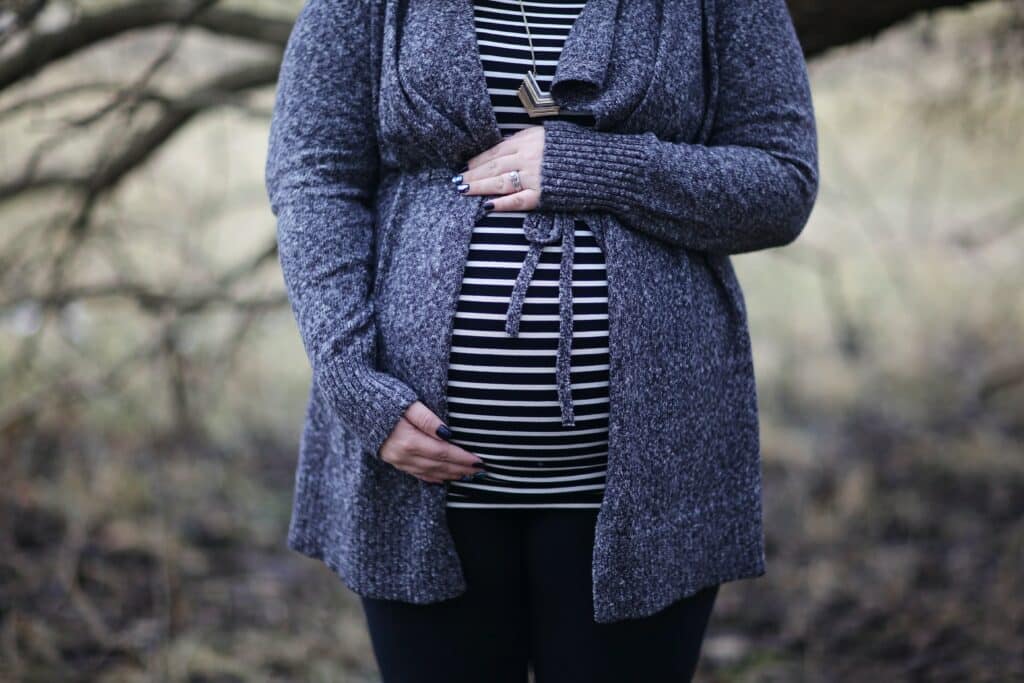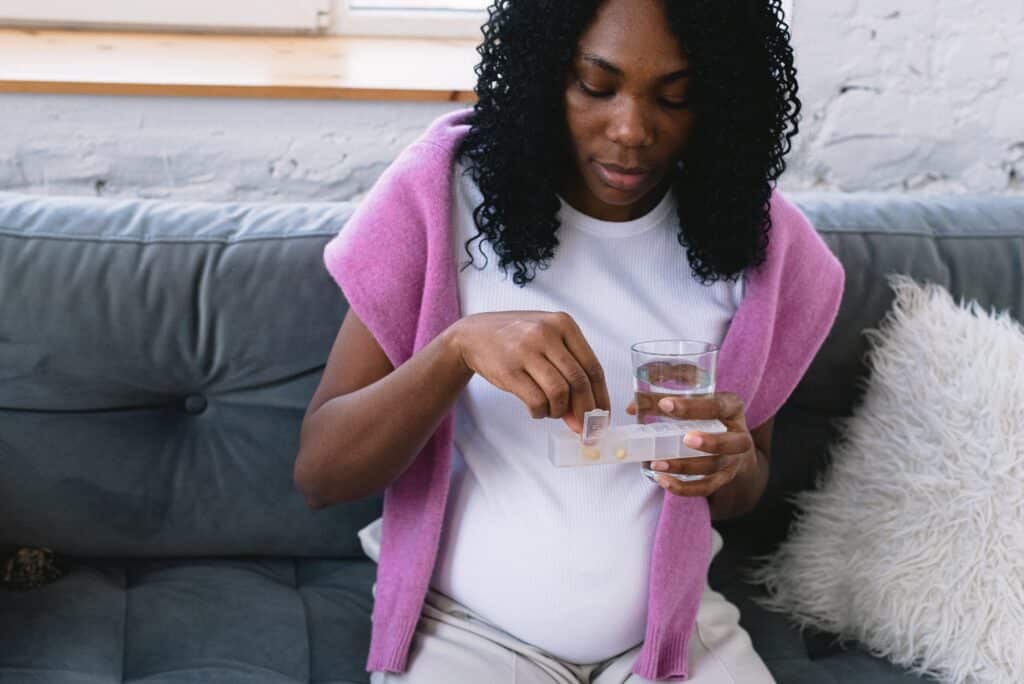
It is essential to know the risks of using opioids while carrying a child.
When pregnant, you need to consider what is best for the baby and yourself. However, your situation may be more complicated if there is opioid use during pregnancy. It becomes more difficult if you have been misusing opioids long before conception.
Opioid use disorder is a disease, not a choice. No one plans to become consumed by an addictive substance that governs every thought and action. It is a downward spiral that happens without a day’s planning.
Maybe you began using prescription opioids to treat an injury and became dependent on them, needing higher doses over time. Perhaps you have gone through traumatic events, and the escape that opioid misuse provided was a miscalculated coping mechanism.
Regardless of how you got here, you probably never planned to deal with opioid use during pregnancy. You deserve the chance to become a parent despite your situation. The good news is that there is hope for recovery, even while pregnant.
The Risks of Opioid Use During Pregnancy
Opioid use during pregnancy is risky for mother and baby. Statistics show that an alarming number of newborns in the US whose mother’s use opioids illicitly encounter complications at birth.
- In 2019, approximately 7 percent of women reported using opioids during pregnancy
- The opioids used were illicit or used for reasons other than pain
- The number of women diagnosed with opioid use disorder (OUD) at delivery increased by 131% from 2010 to 2017.
Stopping opioid misuse can feel nearly impossible, even when not pregnant. Once a woman conceives, the symptoms she experiences can make the thought of quitting seem insurmountable.
Becoming pregnant while addicted to opioids is not a situation to ignore. In fact, ignoring it could lead to an urgent medical crisis.
Untreated opioid use disorder during pregnancy can lead to devastating complications. Both the unborn baby and the mother are at risk when a fetus grows in the womb under these conditions.
Common opioids that can cause complications include:
- Hydrocodone branded as Vicodin
- Oxycodone branded as Percocet
- Street heroin
- Street fentanyl
Unmitigated opioid use during pregnancy can lead to babies being born with Neonatal Abstinence Syndrome (NAS). The risk of NAS after the baby is born is a significant concern in addiction treatment during pregnancy.
What is Neonatal Abstinence Syndrome?
Opioids pass through the placenta to the unborn baby, causing Neonatal Abstinence Syndrome. This results in infants being born with a dependency on the substance. NAS can cause feeding problems, low birth weight, fussiness, respiratory issues, fever, seizures, diarrhea, restlessness, and crying especially a particular high-pitched cry.
2020 data shows that six out of one thousand newborns with hospital stays were diagnosed with NAS. That comes out to about one baby diagnosed with NAS every 24 minutes, or more than 59 newborns diagnosed daily.
In addition, opioid use during pregnancy can lead to permanent congenital disabilities. The possible conditions include:
- Potentially fatal heart defects
- Developmental and behavioral disorders
- Autoimmune diseases
Numerous other complications can occur due to opioid use during pregnancy. Be sure to do your research to learn more.
Withdrawal Safety While Pregnant
If you attempt to stop using opioids while pregnant, withdrawal will occur. When coupled with pregnancy, the discomfort and shock to the body can cause unforeseen problems. It will feel different from detoxing at home when not pregnant.
While withdrawal from opioids is rarely fatal for most people, the stakes are higher for pregnant women. Withdrawing while pregnant can lead to spontaneous miscarriages, including late-term ones, which may require urgent medical intervention.
These situations can involve risks of hemorrhaging and lethal infections, such as sepsis. Some women in these circumstances have experienced sudden preterm labor. This causes them to deliver premature fetuses in non-medical settings, potentially leading to the death of both mother and baby.
During pregnancy medical professionals strongly discourage withdrawal or detox without proper medical supervision due to the risks involved. They recommend immediate medical intervention to ensure the health and safety of both the mother and the unborn child.
Can you Take Suboxone While Pregnant?

The FDA approved buprenorphine and naloxone, also known as Suboxone, to help pregnant women with opioid addiction. This medication, a cornerstone in medication-assisted treatment (MAT) for opioid use disorder, is safe to use during pregnancy and postpartum. Suboxone is a Category C medication for pregnancy, which means there are no controlled studies in humans or animals.
The buprenorphine in Suboxone is used to transition off other opioids. This component significantly lessens withdrawal symptoms, offering a comfortable approach to induction onto Suboxone.
Suboxone makes the shock of stopping opioids less extreme and has less impact on the baby. It also contains an opioid antagonist called naloxone, which helps prevent intravenous misuse of the medication. Injecting naloxone can lead to immediate withdrawal symptoms, thus deterring such misuse.
These risks make it especially important for expecting mothers to work with skilled medical professionals to treat opioid dependency. All pregnant mothers must remain under medical supervision while undertaking any treatment plan.
Buprenorphine for Opioid Addiction During Pregnancy
The goal of buprenorphine in pregnancy is to ensure a safe and healthy outcome for mother and newborn baby. It has minimal adverse effects on developing fetuses and newborns when compared to alternatives.
Providers prescribe buprenorphine medications as soon as the confirmation of the pregnancy. During medication-assisted treatment, your OBGYN and prescribing medical provider will collaborate closely. They will regularly monitor both your health and the health of your unborn child through check-ups, counseling and continuous supervision.
With Suboxone or buprenorphine, the risk of NAS still exists. However, if NAS occurs, the symptoms will usually be milder when compared to other medications or no treatment at all.
The symptoms may also be of shorter duration.
The delivery room staff must know that the mother in labor is undergoing medication-assisted treatment. Together, they can develop an appropriate birth plan. This plan covers all necessary aspects following the baby’s delivery.
Choosing a Treatment Plan
In many cases, Suboxone is the option most often suggested to pregnant patients. However, it is important to note that each person is different.
Working with a medical professional can help you determine the best course for a healthy pregnancy and baby. If you are pregnant and struggling with opioid addiction, choosing a treatment method and actively seeking medication–assisted treatment is crucial. This issue will not resolve itself over time.
To avoid the potentially fatal risks associated with pregnancy and untreated opioid addiction, explore the benefits of Suboxone. Many women have successfully overcome their challenges, turning their lives around and building families, as evidenced by numerous success stories.
AppleGate Recovery Helps Pregnant Women with Opioid Use Disorder

If you are pregnant and seeking help, explore our addiction treatment locations. At AppleGate Recovery, we specialize in assisting pregnant women who aim to minimize the risks of opioid addiction. We hope to lead them to a healthier pregnancy and childbirth.
By treating each patient as a whole and recognizing their unique needs, we create personalized treatment plans. Our approach includes substance use counseling, medication-assisted treatment and various supportive solutions like case management.
Do not delay in seeking the guidance you need to manage your pregnancy alongside addiction. Utilizing medication for opioid use disorder has aided many hopeful mothers. Contact AppleGate Recovery today — we are here to embrace and support you every step of the way.

Contact AppleGate Recovery Today
If opioid addiction is impacting your life or the life of someone you care about, reach out to our treatment center. We are here to provide the support and care you need to take the first step toward recovery.
Call 888.488.5337
